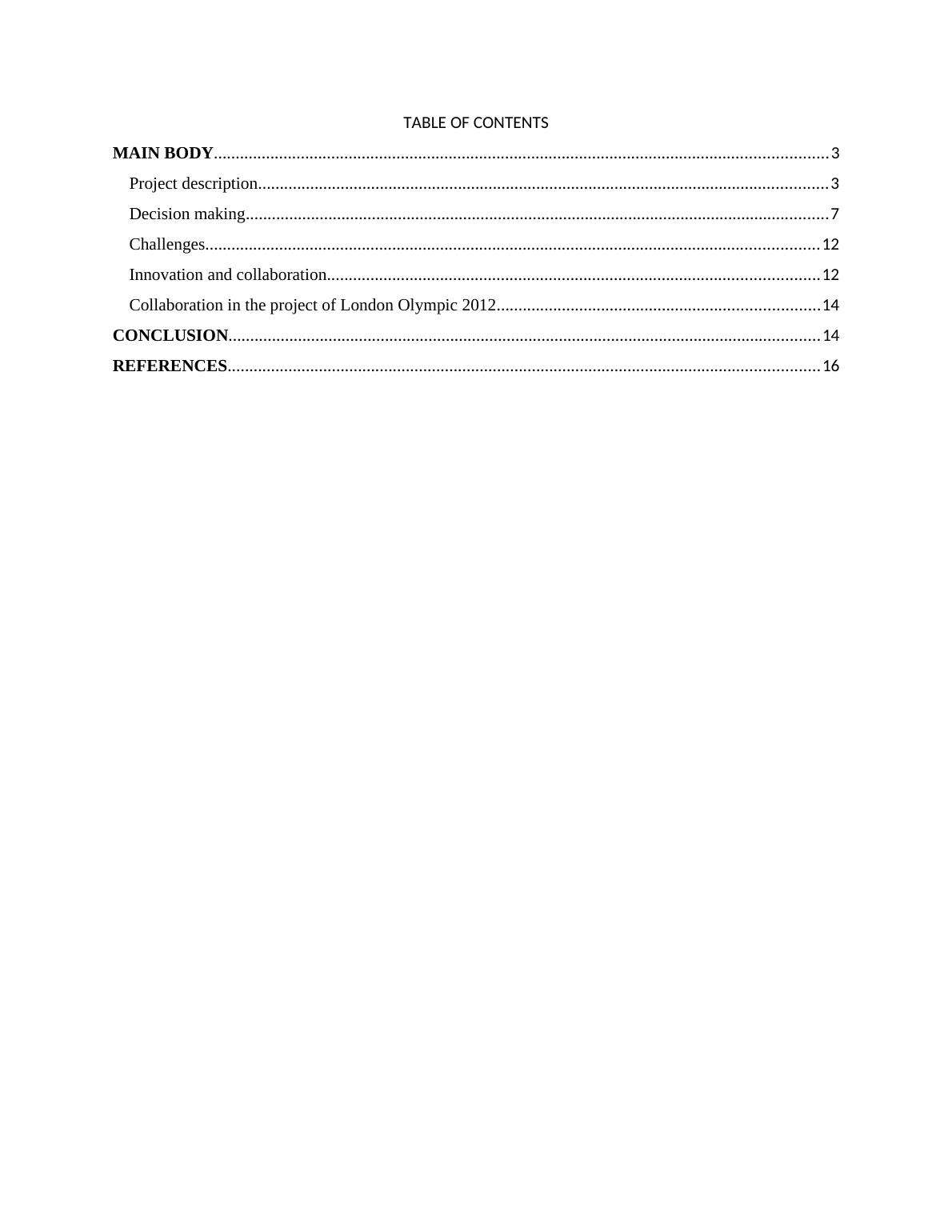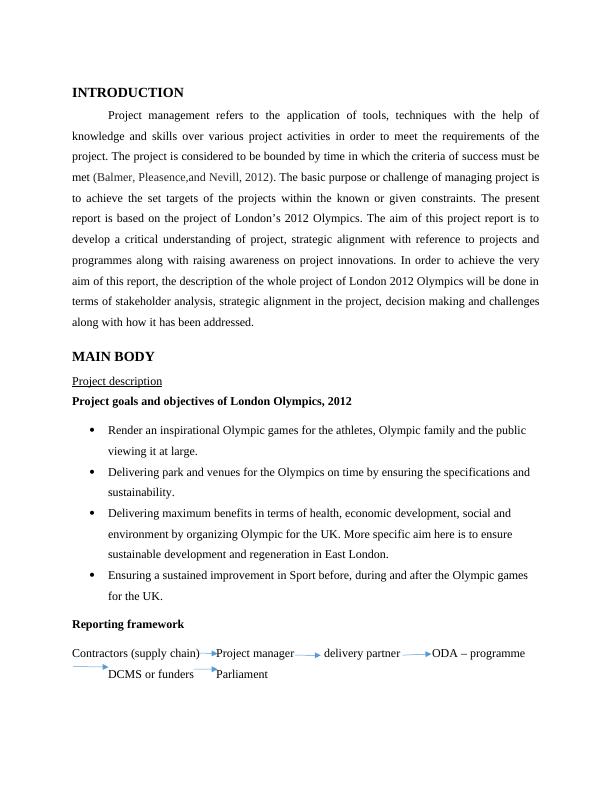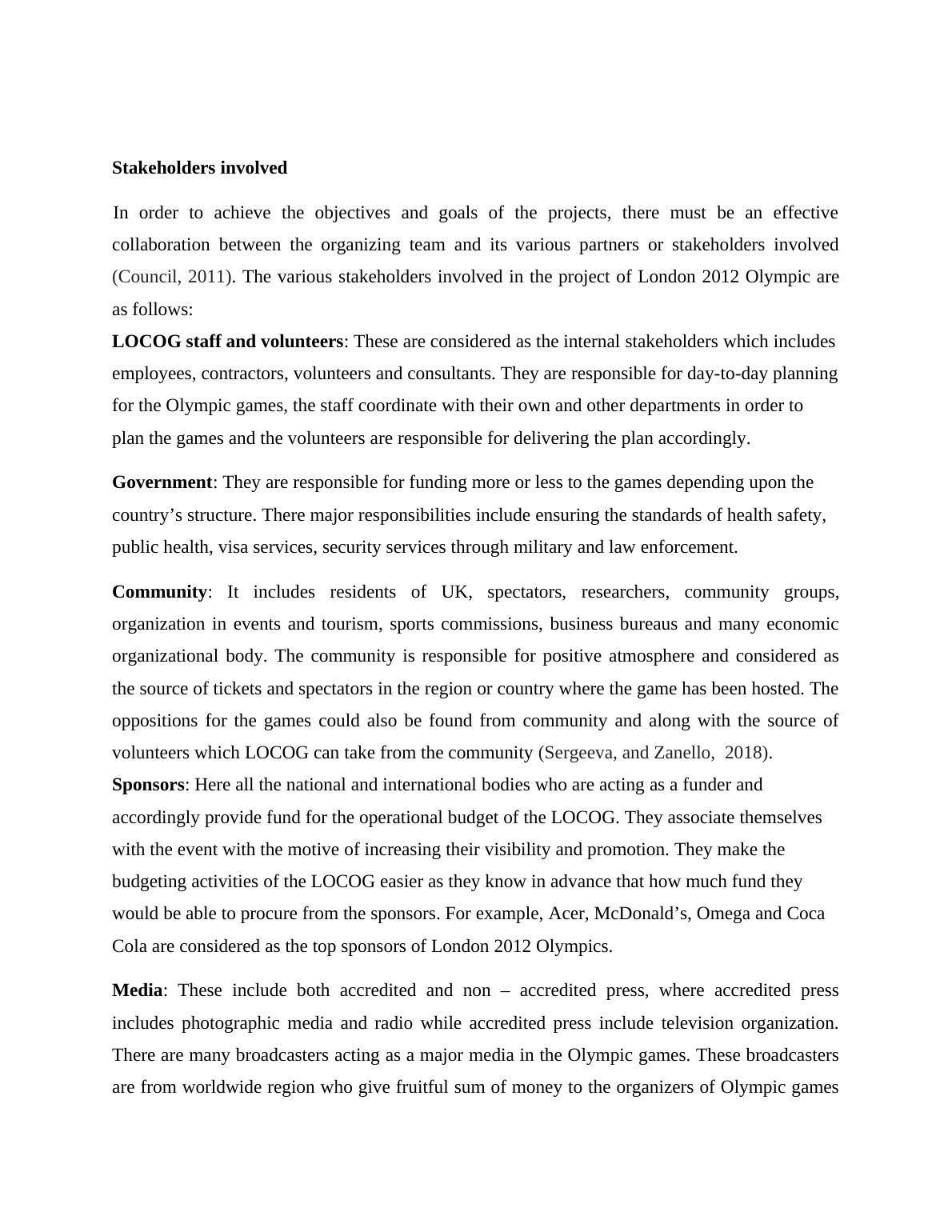Project Management: London 2012 Olympics
Added on 2022-12-26
17 Pages4296 Words1 Views

TABLE OF CONTENTS
MAIN BODY.............................................................................................................................................3
Project description...................................................................................................................................3
Decision making......................................................................................................................................7
Challenges.............................................................................................................................................12
Innovation and collaboration.................................................................................................................12
Collaboration in the project of London Olympic 2012..........................................................................14
CONCLUSION........................................................................................................................................14
REFERENCES........................................................................................................................................16
MAIN BODY.............................................................................................................................................3
Project description...................................................................................................................................3
Decision making......................................................................................................................................7
Challenges.............................................................................................................................................12
Innovation and collaboration.................................................................................................................12
Collaboration in the project of London Olympic 2012..........................................................................14
CONCLUSION........................................................................................................................................14
REFERENCES........................................................................................................................................16

INTRODUCTION
Project management refers to the application of tools, techniques with the help of
knowledge and skills over various project activities in order to meet the requirements of the
project. The project is considered to be bounded by time in which the criteria of success must be
met (Balmer, Pleasence,and Nevill, 2012). The basic purpose or challenge of managing project is
to achieve the set targets of the projects within the known or given constraints. The present
report is based on the project of London’s 2012 Olympics. The aim of this project report is to
develop a critical understanding of project, strategic alignment with reference to projects and
programmes along with raising awareness on project innovations. In order to achieve the very
aim of this report, the description of the whole project of London 2012 Olympics will be done in
terms of stakeholder analysis, strategic alignment in the project, decision making and challenges
along with how it has been addressed.
MAIN BODY
Project description
Project goals and objectives of London Olympics, 2012
Render an inspirational Olympic games for the athletes, Olympic family and the public
viewing it at large.
Delivering park and venues for the Olympics on time by ensuring the specifications and
sustainability.
Delivering maximum benefits in terms of health, economic development, social and
environment by organizing Olympic for the UK. More specific aim here is to ensure
sustainable development and regeneration in East London.
Ensuring a sustained improvement in Sport before, during and after the Olympic games
for the UK.
Reporting framework
Contractors (supply chain) Project manager delivery partner ODA – programme
DCMS or funders Parliament
Project management refers to the application of tools, techniques with the help of
knowledge and skills over various project activities in order to meet the requirements of the
project. The project is considered to be bounded by time in which the criteria of success must be
met (Balmer, Pleasence,and Nevill, 2012). The basic purpose or challenge of managing project is
to achieve the set targets of the projects within the known or given constraints. The present
report is based on the project of London’s 2012 Olympics. The aim of this project report is to
develop a critical understanding of project, strategic alignment with reference to projects and
programmes along with raising awareness on project innovations. In order to achieve the very
aim of this report, the description of the whole project of London 2012 Olympics will be done in
terms of stakeholder analysis, strategic alignment in the project, decision making and challenges
along with how it has been addressed.
MAIN BODY
Project description
Project goals and objectives of London Olympics, 2012
Render an inspirational Olympic games for the athletes, Olympic family and the public
viewing it at large.
Delivering park and venues for the Olympics on time by ensuring the specifications and
sustainability.
Delivering maximum benefits in terms of health, economic development, social and
environment by organizing Olympic for the UK. More specific aim here is to ensure
sustainable development and regeneration in East London.
Ensuring a sustained improvement in Sport before, during and after the Olympic games
for the UK.
Reporting framework
Contractors (supply chain) Project manager delivery partner ODA – programme
DCMS or funders Parliament

Stakeholders involved
In order to achieve the objectives and goals of the projects, there must be an effective
collaboration between the organizing team and its various partners or stakeholders involved
(Council, 2011). The various stakeholders involved in the project of London 2012 Olympic are
as follows:
LOCOG staff and volunteers: These are considered as the internal stakeholders which includes
employees, contractors, volunteers and consultants. They are responsible for day-to-day planning
for the Olympic games, the staff coordinate with their own and other departments in order to
plan the games and the volunteers are responsible for delivering the plan accordingly.
Government: They are responsible for funding more or less to the games depending upon the
country’s structure. There major responsibilities include ensuring the standards of health safety,
public health, visa services, security services through military and law enforcement.
Community: It includes residents of UK, spectators, researchers, community groups,
organization in events and tourism, sports commissions, business bureaus and many economic
organizational body. The community is responsible for positive atmosphere and considered as
the source of tickets and spectators in the region or country where the game has been hosted. The
oppositions for the games could also be found from community and along with the source of
volunteers which LOCOG can take from the community (Sergeeva, and Zanello, 2018).
Sponsors: Here all the national and international bodies who are acting as a funder and
accordingly provide fund for the operational budget of the LOCOG. They associate themselves
with the event with the motive of increasing their visibility and promotion. They make the
budgeting activities of the LOCOG easier as they know in advance that how much fund they
would be able to procure from the sponsors. For example, Acer, McDonald’s, Omega and Coca
Cola are considered as the top sponsors of London 2012 Olympics.
Media: These include both accredited and non – accredited press, where accredited press
includes photographic media and radio while accredited press include television organization.
There are many broadcasters acting as a major media in the Olympic games. These broadcasters
are from worldwide region who give fruitful sum of money to the organizers of Olympic games
In order to achieve the objectives and goals of the projects, there must be an effective
collaboration between the organizing team and its various partners or stakeholders involved
(Council, 2011). The various stakeholders involved in the project of London 2012 Olympic are
as follows:
LOCOG staff and volunteers: These are considered as the internal stakeholders which includes
employees, contractors, volunteers and consultants. They are responsible for day-to-day planning
for the Olympic games, the staff coordinate with their own and other departments in order to
plan the games and the volunteers are responsible for delivering the plan accordingly.
Government: They are responsible for funding more or less to the games depending upon the
country’s structure. There major responsibilities include ensuring the standards of health safety,
public health, visa services, security services through military and law enforcement.
Community: It includes residents of UK, spectators, researchers, community groups,
organization in events and tourism, sports commissions, business bureaus and many economic
organizational body. The community is responsible for positive atmosphere and considered as
the source of tickets and spectators in the region or country where the game has been hosted. The
oppositions for the games could also be found from community and along with the source of
volunteers which LOCOG can take from the community (Sergeeva, and Zanello, 2018).
Sponsors: Here all the national and international bodies who are acting as a funder and
accordingly provide fund for the operational budget of the LOCOG. They associate themselves
with the event with the motive of increasing their visibility and promotion. They make the
budgeting activities of the LOCOG easier as they know in advance that how much fund they
would be able to procure from the sponsors. For example, Acer, McDonald’s, Omega and Coca
Cola are considered as the top sponsors of London 2012 Olympics.
Media: These include both accredited and non – accredited press, where accredited press
includes photographic media and radio while accredited press include television organization.
There are many broadcasters acting as a major media in the Olympic games. These broadcasters
are from worldwide region who give fruitful sum of money to the organizers of Olympic games

End of preview
Want to access all the pages? Upload your documents or become a member.
Related Documents
Management of Construction for London 2012 Olympic Gameslg...
|12
|4099
|294
Case Studies in Project Managementlg...
|16
|3640
|23
Construction Project Analysis: Brazil Football World Cup 2014, Tottenham Hotspur Stadium, London Olympics 2012, Russia 2018 FIFAlg...
|11
|3269
|400
Reflective Case Study Reportlg...
|12
|3745
|145
Reflective Case Study Report on 2012 Olympic Infrastructure Projectlg...
|11
|3196
|144
2012 Olympic Games: Risk Analysis, Stakeholders and Successlg...
|10
|1359
|195